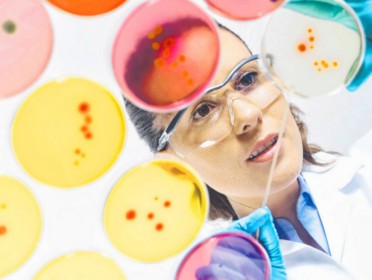
Many diseases that now have a 100 per cent recovery rate were once untreatable. So what medical breakthroughs happening right now will soon be changing lives?
The gift of sight
By 2013, researchers at Bionic Vision Australia hope to start testing a bionic eye that would help people with macular degeneration and retinitis pigmentosa see large objects such as buildings or cars. It includes an implanted chip that uses 98 electrodes to stimulate the patient’s retina.
Researchers are also working on a device that could help patients recognise faces and even read large print.
More effective drugs
By overcoming a huge hurdle facing the pharmaceutical industry, Australian researchers may help to save the lives of cancer patients around the world.
Dr Daniel Christ and PhD students Kip Dudgeon and Romain Rouet, of Sydney’s Garvan Institute of Medical Research, have found a way to create antibodies stable enough to be used in drugs that will meet the stringent standards of drug regulatory authorities.
With antibody-based drugs for treating cancer and inflammatory conditions one of the fastest-growing areas of the pharmaceutical industry, the research is a significant global breakthrough. The team will now work with drug companies to see the research put into use.
Relief for strong pain
People who can’t take morphine may soon have an alternative.
Professor Richard Lewis, of the University of Queensland, is using a $7.6 million grant from the National Health and Medical Research Council to develop a drug based on toxins from cone snails. His team’s collaboration with researchers in Australia, Japan, the US, UK, China and Germany has already seen one of their findings progress to clinical trials.
Greater insulin control
For people with severe type 1 diabetes, who face the threat of comas or repeatedly passing out from low blood-sugar levels, a transplant of pancreative cells called islets can be a lifesaver. However, many of these insulin-producing cells die shortly after transplant, meaning patients have to go back on insulin.
Associate Professor Jenny Gunton, from the Garvan Institute and Westmead Hospital, says researchers have discovered treating islets before transplantation with a drug that boosts production of the HIF-1 alpha protein (a master regulator of cell survival) significantly improves their survival. The drug is already approved for human use.
Leukaemia treatment
Researchers in Melbourne are about to trial a breakthrough treatment for advanced blood cancers such as leukaemia.
Peter MacCallum Cancer Centre scientists have found a way to set off a chain of cellular events that kills cancerous blood cells, while leaving healthy cells largely unharmed.
The first human trials, which will focus on blood cancers such as lymphomas and leukaemias that have not responded to other treatments, will begin at Peter Mac later this year.
Tackling tumours
Californian scientists will spend $20 million testing on humans an antibody molecule that has already been shown to significantly combat cancerous tumours in mice.
The biomedical research team at Stanford University School of Medicine are looking at a cell marker protein known as CD47, normally found on the surfaces of blood cells, that serves as a biological “flag” to immune cells, telling them: “Don’t eat me”. Cancer cells have found a way to secrete the same flag so killer cells leave them alone.
Researchers have developed an antibody that blocks production of CD47. In rodent trials, it has been shown to either destroy tumours or slow their growth.
A better limb
A lightweight, computerised bionic leg that automatically adjusts to changes in speed or terrain has been developed by American researchers.
Lighter and more durable than many earlier prosthetics, the bionic leg makes use of sensors, microprocessors, a motor and a carbon-fiber spring to replicate the natural action of a person’s tendons, muscles and ankle. The prosthesis, suitable for lower-leg amputees, will be available in Australia within the next year.
Reducing HIV risk
The US Food and Drug Administration has just approved the use of an existing drug, Truvada, for reducing the risk of infection by sexually transmitted HIV-1 in adults.
The medication combines two antiretroviral drugs used to treat HIV. Trials show it can reduce risk of HIV infection by up to 44 per cent in gay and bisexual men and as much as 70 per cent in heterosexual couples where one partner is HIV positive.
There is no word yet on when it will be available in Australia.
…and a simple HIV test
Associate Professor David Anderson, of the Burnet Institute for Medical Research and Public Health in Melbourne, has produced a simple and inexpensive blood test for HIV patients that is now being trialled in the US.
A vaccine for skin cancer
Australian cancer expert Professor Ian Frazer, who developed the world’s first cervical cancer vaccine, hopes to develop a vaccine that will eradicate skin cancer. He has just received a Bupa Health Foundation Award to fund his research into the role viruses may play in predisposing patients to developing squamous skin cancer.
“In my lifetime we should be able to remove the threat of skin cancer from the next generation,” the University of Queensland immunology professor and former Australian of the Year says.
Source: bodyandSoul
 We are sharing information for knowledge. Presented by. SocialDiary.Net
We are sharing information for knowledge. Presented by. SocialDiary.Net



